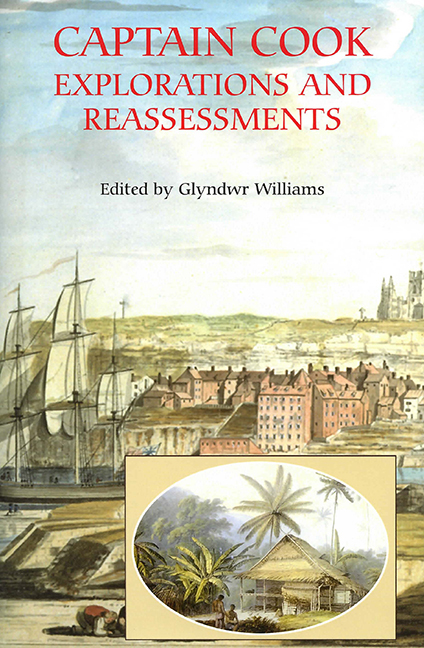Book contents
- Frontmatter
- Contents
- List of illustrations
- Contributors
- Acknowledgements
- Abbreviations
- Introduction
- Part I The Years in England
- Part II The Pacific Voyages
- Part III Captain Cook and his Contemporaries
- Part IV The Legacy of Captain Cook
- 11 Redeeming memory: the martyrdoms of Captain James Cook and Reverend John Williams
- 12 ‘As befits our age, there are no more heroes’: reassessing Captain Cook
- 13 Retracing the Captain: ‘Extreme History’, hard tack and scurvy
- Index
11 - Redeeming memory: the martyrdoms of Captain James Cook and Reverend John Williams
from Part IV - The Legacy of Captain Cook
Published online by Cambridge University Press: 25 October 2017
- Frontmatter
- Contents
- List of illustrations
- Contributors
- Acknowledgements
- Abbreviations
- Introduction
- Part I The Years in England
- Part II The Pacific Voyages
- Part III Captain Cook and his Contemporaries
- Part IV The Legacy of Captain Cook
- 11 Redeeming memory: the martyrdoms of Captain James Cook and Reverend John Williams
- 12 ‘As befits our age, there are no more heroes’: reassessing Captain Cook
- 13 Retracing the Captain: ‘Extreme History’, hard tack and scurvy
- Index
Summary
Almost half a century had passed after Cook's death, when the Revd William Ellis of the London Missionary Society sat in a house in Oahu with several local chiefs, a folio edition of Cook's Voyages spread before him. While poring over the image of the navigator's demise together with the chiefs, Ellis observed: ‘They were greatly affected with the print which represented [Cook's] death … I perceived Karaimoku more than once wipe the tears from his eyes, while conversing about this melancholy event.’ Substituting the name of a British evangelical for that of Karaimoku would change nothing in this narrative. The intended message is that times have changed: the Hawaiians have converted and adopted the civilised manners of the British. Their absorbed interest in Cook's Voyages supplies evidence of how they can read and write; and Ellis proudly parades the fact that even their emotions have been tamed. The chiefs are now willing to cry on account of Cook's death without celebrating it. Ellis's emphasis on how his charges had achieved the mastery of their selves was again evident when he wrote: ‘More than once, when conversing with us on the length of time the missionaries had been in the Society Islands, they have said, “Why did you not come here sooner? Was it because we killed Captain Cook?”’ The Hawaiian memory of Cook was then a truly British and evangelical one. It encompassed civilised remorse, controlled grief and literary safe-keeping.
Although this chapter is not about Captain Cook, it uses the explorer as a departure point for a study of memory and replication. My aim is to characterise the early nineteenth-century Pacific, by discussing how evangelicals modified the memory of Cook, and re-embodied their remembrance of the navigator, in the lives of others who they hoped would become martyrs for their cause. Evangelical theology and rhetoric are quite distant from the way we remember Cook. Yet the passage of memory into history is helpful in stimulating a closer reflection on our memories than would be possible if I were to select a thread of commemoration which we share with this period. The evangelical focus, in what follows, is also appropriate given the dramatic impact that missionaries had on the Pacific. By the middle of the century, the transformation of the Pacific islands was presented by the missionary world as its chief accomplishment.
- Type
- Chapter
- Information
- Captain CookExplorations and Reassessments, pp. 201 - 229Publisher: Boydell & BrewerPrint publication year: 2004



